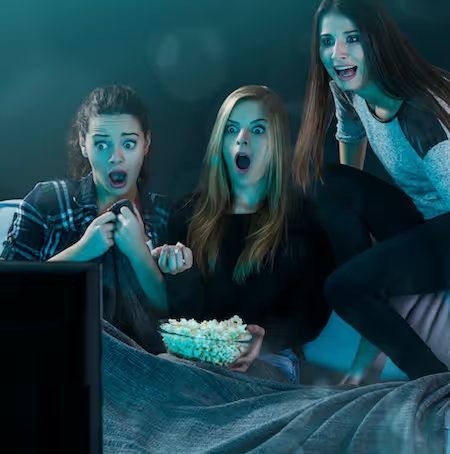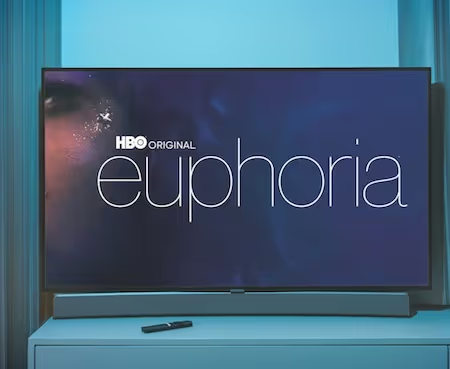.avif)
.avif)

These days, an important topic regarding media offerings is the intensity of gore and shockingly disturbing violence in popular shows. We know that kids are often freaked out by gore, but they become increasingly accustomed to it with age. For many teens, it can be quite appealing.
So today, I’m interested in looking at where we are at this moment in time when it comes to violence in shows. I also want to dig into the future of violence in shows. When our kids have kids (if they do), will these gory shows be as easy to access as they are now? Will they be 10% more intense? 50%?
Take the two most popular Netflix series of all time. Can you guess what they are? "Squid Game" is number one, and "Stranger Things" falls not too far behind.
Like millions of others, my daughter excitedly tuned in to the first episode of the fourth season of "Stranger Things" this summer. When she reemerged from watching, I asked how it was. She said she was disappointed because it was way more violent and gruesome than in previous seasons and just not as good as before. My son, also a fan of the show, didn't notice a significant change. He told me about the gruesome death scenes and said he closed his eyes during them.
When Squid Game first came out, my heart sank. No part of me could watch a show with scenes of human torture. Seeing adults in agony from being humiliated and psychologically tortured or forced to kill people they care about is too intense for me. I watched some non-violent moments of the series to understand the draw and saw that its suspense and drama were well done.
Learn more about showing our movies in your school or community!
Join Screenagers filmmaker Delaney Ruston MD for our latest Podcast

Learn more about our Screen-Free Sleep campaign at the website!
Our movie made for parents and educators of younger kids
Learn more about showing our movies in your school or community!
Millions of people love "Squid Games," which tells us something about the human brain and our emotions. There is something very primal about seeing others undergoing worst-case scenarios. We know this is fiction and our brains can enjoy witnessing horrific scenarios because we know it’s all made up. Of course, many viewers come for the suspense and drama and are only putting up with the super intense gory scenes.
Scary and gory shows come at a price. I remember when my son was at a friend’s house, and they watched a gruesome horror film together, and he was upset for several days. He told me he couldn’t get the images out of his head.
Some youth tell me how they walk away from peers when watching something they don’t want to see. Some tell me how they look away. I ask them, “Do you plug your ears?” I hope they say "yes," and I remind them to do so if they don't.
I will be the first to say that I am on the far side of the bell curve regarding sensitivity to violence and gore in shows. I am glad I have learned to be very intentional about what I watch. I’ll always leave the room if something on TV makes me upset.
Learn more about showing our movies in your school or community!
Join Screenagers filmmaker Delaney Ruston MD for our latest Podcast

Learn more about our Screen-Free Sleep campaign at the website!
Our movie made for parents and educators of younger kids
Join Screenagers filmmaker Delaney Ruston MD for our latest Podcast
I remember sneaking into the horror movie “Halloween" as a tween. However, I always regretted doing that because when I was alone, images from the film circulated through my mind, and things like babysitting became much less enjoyable — (Was that the wind? Erg, what was that???).
While my kids were growing up, I talked about the risks of watching these shows. As parents, we limited access to violent content as best we could, but we also knew that at a certain age, our kids would find this content themselves, whether at a friend’s house or online. It became important to teach them to be mindful and choose their media consumption for themselves. They learned to ask themselves what is worth watching and what might cause more harm than good.
Shows and movies now are more intense than ever before. When discussing these types of shows the other day with a group of friends, I asked, “When are we going to have an X-Rating for Gruesome?”
As we’re about to celebrate 10 years of Screenagers, we want to hear what’s been most helpful and what you’d like to see next.
Please click here to share your thoughts with us in our community survey. It only takes 5–10 minutes, and everyone who completes it will be entered to win one of five $50 Amazon vouchers.
These days, an important topic regarding media offerings is the intensity of gore and shockingly disturbing violence in popular shows. We know that kids are often freaked out by gore, but they become increasingly accustomed to it with age. For many teens, it can be quite appealing.
So today, I’m interested in looking at where we are at this moment in time when it comes to violence in shows. I also want to dig into the future of violence in shows. When our kids have kids (if they do), will these gory shows be as easy to access as they are now? Will they be 10% more intense? 50%?
Take the two most popular Netflix series of all time. Can you guess what they are? "Squid Game" is number one, and "Stranger Things" falls not too far behind.
Like millions of others, my daughter excitedly tuned in to the first episode of the fourth season of "Stranger Things" this summer. When she reemerged from watching, I asked how it was. She said she was disappointed because it was way more violent and gruesome than in previous seasons and just not as good as before. My son, also a fan of the show, didn't notice a significant change. He told me about the gruesome death scenes and said he closed his eyes during them.
When Squid Game first came out, my heart sank. No part of me could watch a show with scenes of human torture. Seeing adults in agony from being humiliated and psychologically tortured or forced to kill people they care about is too intense for me. I watched some non-violent moments of the series to understand the draw and saw that its suspense and drama were well done.
Millions of people love "Squid Games," which tells us something about the human brain and our emotions. There is something very primal about seeing others undergoing worst-case scenarios. We know this is fiction and our brains can enjoy witnessing horrific scenarios because we know it’s all made up. Of course, many viewers come for the suspense and drama and are only putting up with the super intense gory scenes.
Scary and gory shows come at a price. I remember when my son was at a friend’s house, and they watched a gruesome horror film together, and he was upset for several days. He told me he couldn’t get the images out of his head.
Some youth tell me how they walk away from peers when watching something they don’t want to see. Some tell me how they look away. I ask them, “Do you plug your ears?” I hope they say "yes," and I remind them to do so if they don't.
I will be the first to say that I am on the far side of the bell curve regarding sensitivity to violence and gore in shows. I am glad I have learned to be very intentional about what I watch. I’ll always leave the room if something on TV makes me upset.
I remember sneaking into the horror movie “Halloween" as a tween. However, I always regretted doing that because when I was alone, images from the film circulated through my mind, and things like babysitting became much less enjoyable — (Was that the wind? Erg, what was that???).
While my kids were growing up, I talked about the risks of watching these shows. As parents, we limited access to violent content as best we could, but we also knew that at a certain age, our kids would find this content themselves, whether at a friend’s house or online. It became important to teach them to be mindful and choose their media consumption for themselves. They learned to ask themselves what is worth watching and what might cause more harm than good.
Shows and movies now are more intense than ever before. When discussing these types of shows the other day with a group of friends, I asked, “When are we going to have an X-Rating for Gruesome?”
Sign up here to receive the weekly Tech Talk Tuesdays newsletter from Screenagers filmmaker Delaney Ruston MD.
We respect your privacy.
These days, an important topic regarding media offerings is the intensity of gore and shockingly disturbing violence in popular shows. We know that kids are often freaked out by gore, but they become increasingly accustomed to it with age. For many teens, it can be quite appealing.
So today, I’m interested in looking at where we are at this moment in time when it comes to violence in shows. I also want to dig into the future of violence in shows. When our kids have kids (if they do), will these gory shows be as easy to access as they are now? Will they be 10% more intense? 50%?
Take the two most popular Netflix series of all time. Can you guess what they are? "Squid Game" is number one, and "Stranger Things" falls not too far behind.
Like millions of others, my daughter excitedly tuned in to the first episode of the fourth season of "Stranger Things" this summer. When she reemerged from watching, I asked how it was. She said she was disappointed because it was way more violent and gruesome than in previous seasons and just not as good as before. My son, also a fan of the show, didn't notice a significant change. He told me about the gruesome death scenes and said he closed his eyes during them.
When Squid Game first came out, my heart sank. No part of me could watch a show with scenes of human torture. Seeing adults in agony from being humiliated and psychologically tortured or forced to kill people they care about is too intense for me. I watched some non-violent moments of the series to understand the draw and saw that its suspense and drama were well done.

Many young people and adults love horror films and talk about how they love the feeling of being scared. This is so very different from me. I am not at all a fan. This week I have been thinking about ways to talk with kids about when horror in movies, TV shows, and online, in general, go too far.
READ MORE >
The Screenagers’ Tech Talk Tuesday blog from two weeks ago provided four questions for teens to answer regarding the HBO show Euphoria. As intended, the questions sparked conversations among adults and teens, and we got many thoughtful answers from teens in the questionnaire.
READ MORE >
I find HBO’s Euphoria incredibly disturbing and know that although so many of our kids have watched it, many parents never have. Today, I offer a way into a conversation with youth about the show’s topics and popularity.
READ MORE >for more like this, DR. DELANEY RUSTON'S NEW BOOK, PARENTING IN THE SCREEN AGE, IS THE DEFINITIVE GUIDE FOR TODAY’S PARENTS. WITH INSIGHTS ON SCREEN TIME FROM RESEARCHERS, INPUT FROM KIDS & TEENS, THIS BOOK IS PACKED WITH SOLUTIONS FOR HOW TO START AND SUSTAIN PRODUCTIVE FAMILY TALKS ABOUT TECHNOLOGY AND IT’S IMPACT ON OUR MENTAL WELLBEING.
